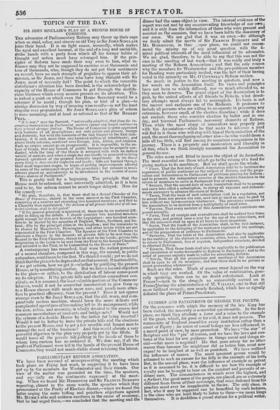TOPICS OP THE DAY.
SIR JOHN SINCLAIR'S PLAN OF A SECOND HOUSE OF COMMONS.
THE advocates of Parliamentary Reform may throw up their caps when so staid, sober, and sincere an old Tory as Sir JOHN SINCLA.IR joins their band. It is no light cause, assuredly, which makes the aged and excellent baronet, at the end of a long and useful life, strike hands with a party from which ail his former habits of thought and action must have estranged him. If the prin- ciples of Reform have made their way even to him, what in- fluence may they not be supposed to exercise over thousands and tens of thousands, who, though they do not put their sentiments on record, have no such strength of prejudice to oppose their ad- mission, as Sir JOHN, and those who have long thought with Sir JOHN, must of necessity feel? The point to which the venerable statistician's attention has been directed, is the acknowledged in- capacity of the House of Commons to get through the multifa- rious business which every session presses on its attention. This is indeed a point on which even the Home Secretary would be a reformer if lie could ; though his plan, or hint of a plan—to abridge discussion by way of insuring wise results—is not the least singular ever propounded. Sir JOHN SINCLAIR'S plan of reform is more assuming, and at least as rational as that of Sir ROBERT
PEEL.
"It is now," says the Baronet, "universally admitted, that from the in- creasing transactions in Parliament, matters cannot any longer continue on their jiresent strange footing. The House of Commons is quite oppressed with business of all descriptions; not only public and private, foreign and domestic, but with the concerns of the vast Empire in the East (con- taining, it is said, more than one hundred million of inhabitants), and above thirty colonies, scattered over Europe, Asia, Africa, and America. Such an empire cannot go on prosperously. It is impossible, in the na- ture of things, that any branch of public business can be properly con- ducted, while the time of- the House is occupied with such an endless variety of matters, and when a single day can hardly be procured to bring forward questions of the greatest domestic importance. In the House every thing is done amidst confusion and bustle ; bills are hurried through their most important stages, in hopes of getting improvements effected in some of the subsequent steps of the procedure ; but reliance is muck oftener placed on amendments to be introduced in the course of some future session of Parliament."
This is pretty well for a beginning. The principle that the House must be reformed, once universally admitted, as it is here said to be, the reform cannot be much longer delayed. Now for the remedy :- " My plan, therefore, is, that there shall be a Second Chamber of the House of Commons, chosen in the • same manner as. the Firit• Chamber, consisting of a number not exceeding two hundred members; and that to a Chamber thus constituted, the decision of all private bills and of all con- tested elections shall be delegated.' "If the general principle is approved of, there can be no material diffi- culty in fillin,r° up the details. I should consider two hundred members quite enough for this new branch of the Legislature : one hundred mem- bers to be elected by the counties of England, Wales, Scotland, and Ire- land ; fifty by the principal cities in the kingdom ; and the remainder to be chosen by Manchester, Birmingham, and other towns which are not represented in the First Chamber. The Speaker of the First Chamber to nominate a Deputy to the Second ; all private bills to be sent from the Second to the First Chamber, thence to be sent to the Lords ; private bills originating in the Lords to be sent from the First to the Second Chamber, and returned to the First, to be transmitted to the House of Peers." A contemporary has remarked, that were the nation possessed of a second chamber, composed in this way, the second, in public estimation, would soon be the first. We think it would; yet we do not think that the plan is to be deprecated on that account. It matterslittle, if we get reform, how we get it—whether by purifying the present House, or by constituting another. But we have a second objection to the plan—or rather, to the distribution of labour consequent on its adoption. If the private bills and election committees con- stitute, as it is assumed, the least valuable portion of the Commons' labours, would it not be somewhat inconsistent to give them up to a House chosen with much more care, and much more atten- tion to practical efficiency, than the present ? Does it not appear strange even to Sir JOHN SINCLAIR, that the old, worn, and com- paratively useless machine, should have the more delicate and complicated operations oflawmaking left to its management, while the new, active, and accurate, is wholly devoted to the coarse and common manufacture of road-acts and bridge-acts ? Would not the scheme of a double House be the better for being inverted ? Would it not be better to leave the private bills and the elections to the present House, and to get a few sensible and honest men to manage the rest of the business ? And this would obviate a very powerful objection to the plan very properly put by the Globe. It would leave all the private bill-jobbing in the hands of those to whom long custom has so endeared it. We dare say, if all the profits of Parliament were left in the hands of the present House of Commons, they would not much stickle about retaining the labour.


























 Previous page
Previous page